- Home
- Lord Dunsany
The Curse of the Wise Woman Page 2
The Curse of the Wise Woman Read online
Page 2
So in the evening we were sitting before the fire in the library, and it was late, and he had sent for the glass of milk that he always drank with whiskey before going to bed. There were only us: my mother had died years ago. We were alone in the large house but for the cook and the kitchenmaid and the one housemaid: the butler lived half a mile away, and had long gone to bed. And there was a boy, living over the stables, who did odd work in the house by day. We were not talking much. Perhaps I was sore about not having been allowed to go to Lisronagh; I don’t remember now. Of course I had had ample warning about the holiday task; my father had often told me to do it and I had not started it yet: partly laziness; chiefly, I suppose; and partly that feeling that my father did not understand the attitude of the world to a holiday task: my world, I mean. I obeyed my father as much as most boys do; but there was one curious thing over which he seemed to exert all his personal force, all that was left to him as he grew old, and even more, as though he called up hidden reserves of power; and that was that one day in that room he might say to me “Look at the picture,” and if ever he did I was to go immediately to a little Dutch picture at the end of the room and watch it; I forget for how long, but I was to watch it minutely. And, if ever he said those words, I was never to think that he did not mean them, or that it was a joke, or that there was time to spare. He told me this often. Why? He never told me why.
Well, there we were sitting, and the house was all shut up; my father always went round every shutter himself to see they were properly fastened, and I used to think it rather unnecessary, for we knew everybody all round us; but once when I said something of this to my father he had replied: “You never know who might come over the bog.” And certainly on the other side of the bog there were hills of which we knew nothing. Yet the idea that, even over there, could be anyone with enmity for my father, seemed, I remember, absurd to me: for one thing he did not seem active enough to have his share of such enmities; but that was a boy’s idea, forgetting he had been younger.
We were talking when at all about Lisronagh, for I wanted quietly to find out what day I might go; when the housemaid brought in the milk, a tumbler of plain milk which he used to mix with the whiskey himself, after tasting the milk to see that it was not sour. The housemaid left the room, and he put his hand to the tumbler that stood on a table beside him. I can see him now more clearly than I can picture faces seen yesterday; tall and thin, with fine profile, with the firelight in his greying beard. And I was talking of Lisronagh. I thought he would have let me go next day, till he said definitely: “Not this week.” I remember the words because they fell on my ears with such a sense of disaster, yearning as I was to get to Lisronagh before the geese had gone, and because they were the last words but four that I ever heard him say. He lifted the glass of milk to his lips and then put it down again, and turned to me and said: “Look at the picture.” And he said it with none of the authority I had expected, if ever I really expected he would say those words at all, with less authority by far than that with which he forbade me to go to Lisronagh; but as though he were very tired.
I did as I had been taught. I went without thinking he did not mean it, or that there was time to spare: I went to the little Dutch picture and gazed at the tiny figures, skating past churches and windmills over grey ice. The picture was near the door, the only door in the room, which was shut, until it was opened from outside, and four tall men came in. Then I looked round, and my father was gone.
I saw at once that the men were from the other side of the bog; they were dark and strange and like none of our men. They peered round the room, then one of them looked at me fixedly and said: “There is no one we have a greater respect for than your father, but it is a pity he mixed himself up with politics the way he did; and it’s the way it is we want to speak to him, and no one could be sorrier than myself that I have to say it.”
Then I knew they had come to shoot my father.
So I said: “He is up in his room, but I’ll go and fetch him.”
“You will not, sir,” said the same man. “But we will come with you.”
So they looked amongst all the curtains in the library, and behind a sofa that there was, and found nothing, and then I walked slowly up the stairs, and they came with me. So slowly I went that one of them shouted: “Come on, now.” And at that I started forward and ran up a few steps, and fell at the top of a flight. I got up slowly, and then limped a little. All this gained time.
When we came to the door of my father’s room I knocked, but they shoved in past me. The room was in darkness and I got a match for them and lit a candle: they looked round the room carefully, and we gained time there.
I said: “He must be in his study.” And then I added: “Perhaps he is in another bedroom. Shall we go there first?”
But the man who had spoken before said: “You will go to the study.” So I did as he told me and we all went downstairs. All the time I was calculating how far my father could have got. How he had got out of the library I had no idea; there was only one door and all the shutters were shut; but gone he had. And even if he went by some narrow passage, and difficult steps in the dark, I calculated that with our various trifling delays, that all add up, he had gone by now as far as we had, and that that should have just taken him clear of the house. He would make of course for the stables: that was a hundred yards. And then he would have to get in, and saddle his horse and get out again, and past the gate by the house, before one could think him safe.
When we entered the study I think they saw at a glance that my father was not there, and never had been. It was not only that the fire was unlighted, but the look and feel of the room told you at once that it never was used by anyone. And indeed, except for meals, we never used any room at all but the library. And they all looked at me in a rather nasty way.
“If you don’t show us where he is, we’ll burn the house,” said one of them that had not spoken before.
“You will not,” I said, looking straight at him.
And his face fell at that, and I saw the eyes of all of them turn downwards. For they knew, whoever they were or wherever they came from, that we kept a piece of the true Cross at High Gaut, and had done for ages, ever since it had been granted to us for the help my family gave in a war of one of the popes. I saw they were thinking of it, and did not have to remind them that if a man burned that, the flames might not be so easily quenched. They would flicker about his soul all through eternity.
But you do not always know, when you invoke powers like that, whom in the end they will benefit. The leader turned to me and told me to get the cross. It was a crystal cross and part of the crystal was hollow, and in the hollow the piece of the true Cross was. I knew what they wanted it for: they were going to swear me on it. And I grew suddenly afraid of the cross, and afraid of the men.
I had to get it: it was in that very room; in a little golden box on a marble table. It was never locked up; there was no need for that. I went across the room to get it, and they all drew their pistols as I went. They took them out of their pockets, in which I knew they had them, but they had not shown them before. Now they were getting annoyed because they had not found my father, and I saw that they were not going to let me escape from swearing to them on the Cross. They were long, single-barrelled pistols, old even then; nothing like the automatics they use nowadays.
When I came back with the relic I saw that they had me covered. I came up to them and lifted it in my hand, and they all dropped on their knees. “Do you swear,” said the leader, kneeling before me, but still covering me with the long black pistol, “to the best of your knowledge and your belief that your father is still in this house?”
And while he spoke I heard the clip clop, clip clop, of my father’s horse coming out of the stables. But it was only coming at a walk. That was of course so as to make less noise, and then there was a gate that he would have to open, but somehow I had thought he would gallop. Almost at once he got on to the grass, and they had no
t heard him, but he had to come right past the house. I could still hear every step of the horse, but I suppose it is easier to hear what you are listening for, if you are listening as I was; while they were all watching me and the cross that I held and waiting for me to speak, and they never heard the horse coming by on the grass. But they would have if I hadn’t spoken just when I did. He wasn’t safe till he’d opened the gate another fifty yards on. “I swear,” I said, “to the best of my knowledge and my belief,” speaking slowly, spinning it out as long as I could, to drown the noise of the hooves, “that my father is in this house.”
I suppose one puts one’s soul in danger oftener than one thinks, and in less good causes. The risk frightened me when I took it. If it wasn’t the true Cross, and (God help me) I’ve sometimes doubted it, then no harm was done. If it was, could it be on the side of these four men and against my father? But I was not easy about what I’d done, for a single moment, till I went to Father McGillicud and told him all. “And would you murder your father,” he said, “and with the true Cross in your hand?” Then I knew that I’d done right.
When I had sworn I put the relic down, and they all rose from their knees, and as they rose I heard the hoof-beats stop. My father was opening the gate.
That is the scene that remains with me today, so far away from Ireland, as clear as any picture that one could hang on the wall; the old room in my home, and the four men kneeling before me with their pistols. It takes a wealth of experience in many peaceful years to make a man forget having looked from the wrong end along fire-arms; and the first time he probably never forgets; but it is their earnest, devout faces that I see in my memory as vividly as their weapons.
When I put the relic down they began to search the house. My father must still have been fumbling with the gate, for I did not hear as yet the sound I was waiting for. It was one of those gates that you had to dismount to open. I went with them from room to room; and suddenly, in the first room that we came to, I heard my father’s horse. It was trotting now. I began talking hurriedly, and still they seemed not to hear the horse. There was the lodge still ahead of him, and the lodge gates, but I felt he was almost safe now. I never knew how these men had come, whether on horse or driving or on foot, and did not know what means of pursuit they might have; but I felt he was nearly safe, though I wished he would gallop. We went from room to room, and they searched thoroughly, paying no attention to my suggestions that I made to drown the sound of the trotting hooves, growing fainter and fainter; but, in the hugeness and the stillness of the night, they were clearly audible all the way to the lodge. Sometimes the four tall men stopped suddenly still and listened, to hear if my father was moving about the house before them, but they never heard the hooves. Large deserted rooms that we never used we passed through, with a feeling of emptiness and damp about them, and so little suggesting the presence of either my father or any living man that one of them said to me: “Was there ever a ghost here?” And partly because of the look and feel of the room, with only one candle burning, and partly because of the habit I had picked up from the people all round me of rather avoiding a straight answer, I said: “I wouldn’t trust it.” I think that hurried them on, which is what I should most have avoided; but, as they came to the last room, I heard all of a sudden ring out in the heart of the night the sound of a horse galloping. It was my father, clear of the lodge, on the high road. It must have been half a mile away, but the sound of a horse at night galloping is a sound that they could not have missed. They all stood still at once. “It’s himself,” said one. They looked at me, but gave up any notion of my complicity; then they turned to their own plans and began to hurry towards the hall door. I started making conversation with them about shooting. One of them listened to me, and soon I was telling him of the geese on Lisronagh bog. It was a safer topic than some that they might have started, if left to themselves. To look at him you would have said that he was the worst of the four, and yet he told me little things about shooting that are pure gold to a boy; and, when he saw how keen I was on the geese, he said to me just as they all went out through the door: “And a goose takes a long time to get his pace up. Don’t aim so much in front of a goose as you do at other birds.”
And then when they’d all gone he opened the door again and put his head inside, and said, word for word as I write it: “And if it ever comes to it, and God knows the world’s full of trouble, aim a foot in front of a man walking, at a hundred yards.”
CHAPTER II
It was pretty late when the four men were gone. I went back to the library, the room we used every day, and began to look round it with new eyes. There was only one door, as I told you, and I had been standing near it while it was shut, and in half a minute while I was not watching him my father had left the room. There was a large mirror with heavy wooden frame at the far end of the room from the Dutch picture, and two dark cupboards of carved wood. I suspected the frame of the mirror, but how you moved it I could not see. So I left this mystery and tried to find out the other, what warning my father had had; for the men had not reached the stairs, and there was no sound of steps when he vanished. And the second mystery I discovered. I think that now that my father was safe, and the men had gone, the strongest emotion in me was curiosity. I sat in the chair in which my father had been sitting; I looked so as to see everything that he could have seen, sitting there; I tried to remember all that he could have heard, as the housemaid came in with the milk. But it was not sight or hearing that warned him. I sat as he had sat, holding the glass of milk; I even raised the glass to my lips as he had done. And then I got it, even after so long; for there was still hanging over the milk the scent of the queer black tobacco they used to smoke in those parts.
The men had come by the back door and through the kitchen. How much had Mary, the housemaid, seen of them? What did she know of their purpose? These things I never knew. But the smell of their black tobacco had lingered upon the milk. With no men of our own in the house the meaning of that pungent smell on the milk must have been clear enough to my father. And he may have been expecting those men for years. When you’ve anything like that on your mind you can’t afford to miss warnings, if ever they come.
Then I put out the lamps and went to bed, without saying a word to Mary. Why did I go without telling her that her master, to whom she was much attached, had left the house that she had tended for years and loved? It’s hard to explain. “Vox populi, vox Dei,” is a saying that gives some hint of it. She cared devotedly for our family, and yet I think that in her very blood was a feeling that the people couldn’t be wrong. I believe she would have fought a burglar single-handed if one had entered our house; but this vengeance that came from the hills over the bog was something that I thought she might have strange feelings about, stronger than all her kinder sympathies, something I can only compare with the feeling that the Englishman has for the law. And it’s no use pretending to you that I do not sympathise with the Irish point of view: an Englishman honours the law, and a very convenient thing it is for everyone that he does so; but it’s a dull thing when all’s said. Now an Irishman will honour a song, if it’s worth honouring, though his doing so is of no convenience to anybody; but he’ll never honour the law, however much it might suit the community, because a law is not sufficiently beautiful in itself to work up any enthusiasm over. It’s a point I sometimes try to explain to Monsieur Alphonse, who is fond of songs, but he will not understand.
But to return to my story, I told Mary nothing, and in the morning I saw by the tears running down her face when she called me, that she had found out for herself. “Mr. Peridore is gone,” she said. “The poor duke is gone.”
I should explain that a forbear of ours who had followed James II to exile had been given a dukedom by him. One day on the shore of France, looking across to the cliffs of England, he had made him Duke of Dover, and my family had used the title for so long as they remained in exile, but we do not use it now. Oddly enough the peasantry all round about
us still remember it; they are the only people that do.

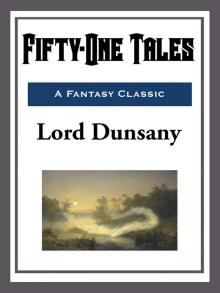 Fifty-One Tales
Fifty-One Tales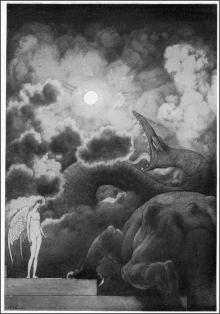 Time and the Gods
Time and the Gods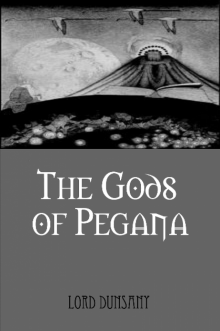 The Gods of Pegana
The Gods of Pegana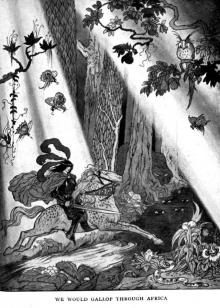 A Dreamer's Tales
A Dreamer's Tales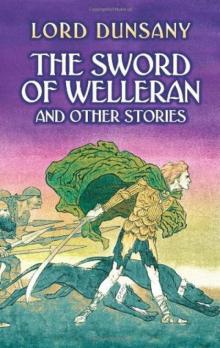 The Sword of Welleran and Other Stories
The Sword of Welleran and Other Stories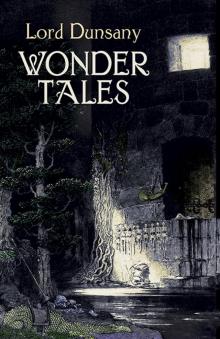 Tales of Wonder
Tales of Wonder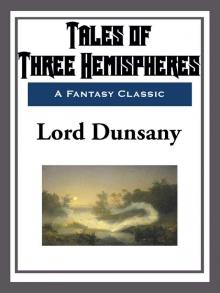 Tales of Three Hemispheres
Tales of Three Hemispheres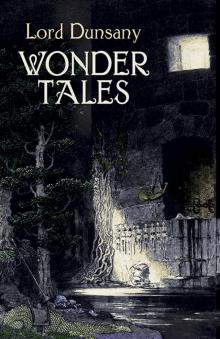 The Book of Wonder
The Book of Wonder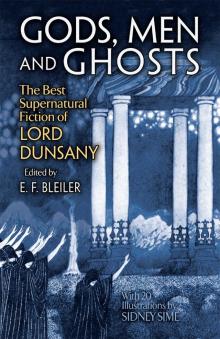 Gods, Men and Ghosts
Gods, Men and Ghosts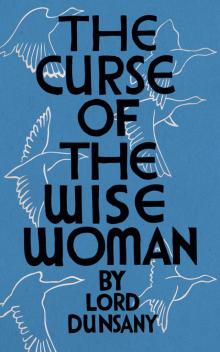 The Curse of the Wise Woman
The Curse of the Wise Woman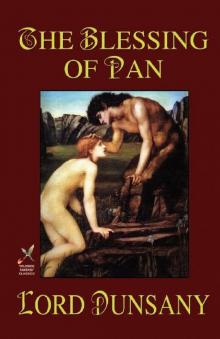 The Blessing of Pan
The Blessing of Pan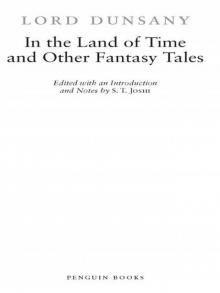 In the Land of Time
In the Land of Time